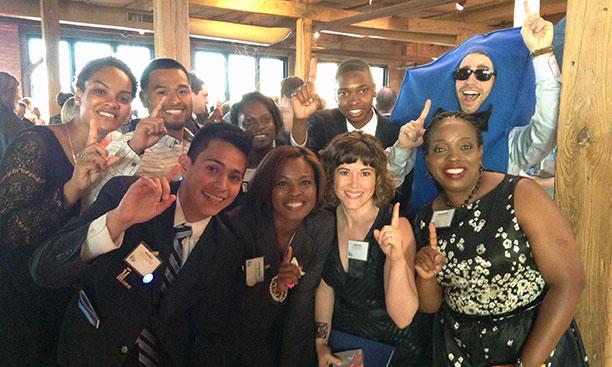
Paige Ponder ’96 and the nonprofit she leads, One Million Degrees (OMD), are trying to change minds. Achieving their mission of increasing community college students’ graduation rates in Chicago means elevating that population’s stature in society while simultaneously helping these students envision how they can succeed against great odds.
“Community colleges generally exist sort of on the margins of [employers’] thinking even though they serve not a marginal population, but half of the public undergraduate population in Illinois and I think across the country,” Ponder explained. “But when I tell people that, they’re shocked.” Employers “should be rolling out the red carpet” for these hard-working students, she added emphatically, instead of excluding them by requiring a 4-year degree.
Most of the day-to-day work of OMD, she said, involves helping community college students overcome two types of challenges: “external” ones like working while in school, supporting dependents, or not having computers or internet access at home; and “internal” ones, like wondering whether they really belong in college or if they have what it takes to finish their degrees.
OMD has developed a combination of services to combat these barriers. Upon acceptance into the program, a student is referred to as an “OMD scholar” and is assigned a program coordinator who creates an individualized plan, designating how frequently the student will meet with the program coordinator on their campus, and introducing them to a volunteer coach — usually a professional working in an industry related to that student’s studies or interests. In addition, about 40 precent of participants will be assigned an OMD tutor to support them academically. All OMD scholars earn a stipend if they meet program expectations.
Ponder said that while students are often initially attracted to the program by the stipend and the free tutoring, halfway through, when the scholars are asked to rank the services, the majority say the program coordinators and coaches are what they value most.
“They want to take this chance to get this degree and get a job and really make something of their lives,” Ponder explained. “Many are seeking a community that is really going to support them in doing this.”
Experiences at Princeton helped launch Ponder in this direction. She took a sociology of poverty class sophomore year with Professor Sara McLanahan, which led her to apply to the Woodrow Wilson School of Public and International Affairs, where she pursued a self-designed concentration in poverty, welfare policy, and education.
In addition, the mentoring Ponder received as a Princeton Project 55 Fellow from Chet Safian ’55 helped set her course. She started the fellowship as a teacher in an under-resourced Catholic school in the South Bronx, and stayed on an additional three years, becoming assistant principal and development director. When she told Safian she wanted to keep growing as a leader in education, his advice was nontraditional, but astute: He told her to go to business school. She landed at the Kellog School of Management at Northwestern University.
“Kellog turned out to be a really good choice because a lot of people there are interested in social impact, so I found lots of kindred spirits,” Ponder said. “In hindsight, I think really what I was doing was preparing myself to do something just like this.”
Ponder’s MBA training prepared her to help OMD grow. When she came on board in 2012, OMD was six years old and serving 125 students per year. Five years later, the program serves 800 students per year with 30 staff members and 700 volunteer coaches. She has helped to raise $15 million for OMD during her tenure, and the graduation rate for students they serve who are full-time students and attending college for the first time is double the graduation rate of the overall population of community college students in Chicago and Illinois.
Ponder recalls being influenced by a podcast she heard that asserted that community colleges are engines of social mobility. “The people that are in our programs are total rock stars,” she said, noting that 85 percent of alumni continue their education beyond an associate’s degree or are working, or both at the same time. “They’re getting jobs we hope will put them in a position to be upwardly mobile.”
